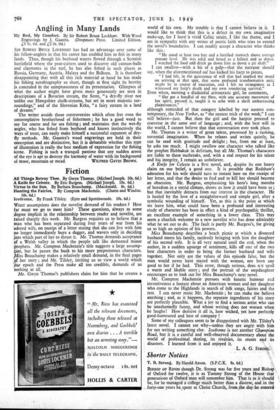Fiction 10s. 6d.)
WHAT assumptions does the novelist demand. of his readers ? How far must we go to meet him? These questions, always to some degree implicit in the relationship between reader and novelist, are 'raised sharply this week. Mr. Burgess requires us to believe that a man who has been separated during four years of war from his adored wife, on receipt of a letter stating that she can live with him no longer immediately buys a dagger, and wavers only in deciding into which part of her to thrust it. Mr. Thomas demands acceptance of a Welsh valley in which the people talk like demented minor prophets. Mr. Compton Mackenzie's tide suggests a large assump- tion, but he passes the buck to his more preposterous characters. Miss Beauchamp makes a relatively small demand, in the final pages of her story ; and Mr. Tilsley, inviting us to view a world which our epoch and the Press make all too credible, demands of us 'nothing at all.
Mr. Gwyn Thomas's publishers claim for him that he creates a
world of his own. My trouble is that I cannot believe in it. I would like to think that this is a defect in my own imaginative make-up, for I have -a vivid Celtic strain, I like the theme, and I am in sympathy with any writer of poetic faith who tries to extend the novel's boundaries. I can readily accept a character who thinks like this "He stood at least two feet and a fortified stomach above average peasant level. He was solid and broad as a hillock and as dense. I watched the food arid drink go down him as down a pit shaft." I can swallow—with a bit of a gulp—that the narrator should say, when the aforementioned oaf has kicked his harp to pieces, "I had felt, in the quiescence of will that had marked my mood on arriving at that spot, that some profound transformative antic might be in course of execution, and I felt no strangeness as I witnessed my harp's death and my own wondering survival." Even when, meeting a disdainful aristocratic girl, he comments, "She got a handful of my fibre, with one accurate movement of her spirit, pressed it, taught it to ache with a shrill embarrassing
plaintiveness," '
although reminded of that category labelled by our austere con- temporary, the New Yorker, as "the neatest trick of the week," I can still believe—just. But then the girl and the harpist proceed to converse in the same sort of language ; and, with the best will in the world, I cannot believe that that conversation ever took place.
Mr. Thomas is a writer of great talent, possessed by a rushing, torrential imagination. When he relaxes and writes quietly, he can be read with gratitude and delight ; but, from me at least, he asks too much. I might swallow one character who talked like the prophet Habbakuk in delirium, but all Mr. Thomas's characters are liable to these outbreaks, and, with a real respect for his talent and his integrity, I remain an unbeliever.
A Knife for Celeste is a first novel, and, despite its one heavy claim on our belief, a good one. It is possible that Redshaw's adoration for his wife should turn to instant hate on the receipt of her letter, and that the desire to find and to kill her should become an obsession. Mr. Burgess, emphasising his hero's long months of boredom in a torrid climate, shows us how jt could have been so ; but that inevitably detracts from our interest in the character. He is healed by the love of a straightforward and simple girl, after a symbolic wounding of himself. Yet, as this is the point at which we leave him, what could have been a profound and interesting study of character has been in effect a kind of psychopathic thriller, an excellent example of something in a lower class. This may seem a churlish welcome to a new novelist who has done admirably what he set out to do. The fault is partly Mr. Burgess's, for giving us so high an opinion of his powers.
Miss Beauchamp describes a beach picnic at which a divorced husband meets his family, tactlessly bringing with him the daughter of his second wife. It is all very natural until the end, when the author, in a sudden upsurge of sentiment, kills off one of the two best characters in order to bring the former husband and wife together. Not only are the values of this episode false, but the man would never have stayed with the woman, nor been any good to her if he had. This error, though serious, does nit spoil a warm and likable story ; and the portrait of the stepdaughter encourages us to look out for Miss Beauchamp's next novel.
Mr. Compton Mackenzie pursues with lunatic humour and inventiveness a fantasy about an American woman and her daughter who come to the Highlands in search of folk songs, fairies and the rest. I can never resist Mr. Mackenzie ; he can make me believe anything ; and, as it happens, the separate ingredients of his story are perfectly plausible. What a joy to find a serious artist who can be unashamedly funny, and whose writing does not worsen when he laughs! How derisive it all is, how wicked, yet how perfectly good-humoured and best of company !
Some of my colleagues seem to be disappointed with Mr. Tilsley's latest novel. I cannot see why—unless they are angry with him for not writing something else. Icedrome is not another Champion Road, but it is a careful and well-observed documentary about the world of professional skating, its rivalries, its stunts and its disasters. I learned from it and enjoyed it.
L. A. G. SittoNio:


































 Previous page
Previous page